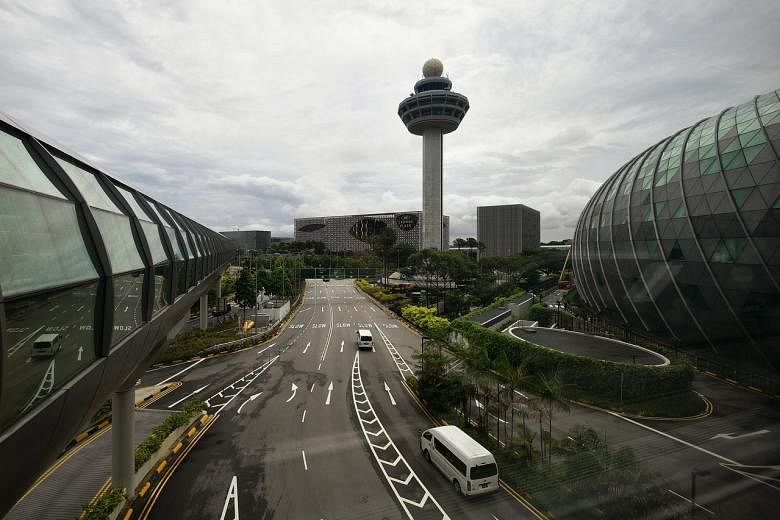SINGAPORE - The stay-home notice (SHN) period for travellers from higher-risk countries or regions will be lengthened to 21 days, up from 14 days, said Education Minister Lawrence Wong on Tuesday (May 4).
The extended SHN will apply to travellers arriving from all countries and regions, except Australia, Brunei, mainland China, New Zealand, Taiwan, Hong Kong and Macau, from Friday at 11.59pm. They will be required to serve their 21-day SHN at dedicated facilities.
In addition, the period of recent travel history being assessed for border measures will also be increased to 21 days from 14. This excludes bilaterally negotiated travel lanes, such as the reciprocal green lane or air travel bubble arrangements.
On these measures, Mr Wong said: "We are adopting this more stringent border measure up till the end of May. At that time, we will do a further review, depending on the global and local situation, and we will continue to update and fine-tune our border measures."
Mr Wong, who is also co-chair of the multi-ministry task force handling Covid-19, was speaking at a press conference where a host of measures were announced to curb infections in Singapore following the recent increase in unlinked community cases in the country and new waves in several countries.
Other border measures will also be tightened from Friday, 11.59pm.
A Ministry of Health (MOH) statement on Tuesday said: "In view of the worsening situation globally, we will further tighten our border measures for travellers with recent travel history to higher-risk countries/regions, and reduce entry approvals for non-Singapore citizens/permanent residents with immediate effect."
Travellers from Fiji and Vietnam in the past 21 days before arrival in Singapore will be subjected to a 21-day SHN at dedicated facilities, with the option to serve the last seven days at their places of residence, said MOH.
They were previously allowed to opt out of serving the 14-day SHN at dedicated facilities and could serve it at their place of residence instead, subject to certain criteria.
Those coming from Britain, South Africa, Bangladesh, India, Nepal, Pakistan and Sri Lanka from Friday, 11.59pm, will be required to serve the full 21-day SHN at dedicated facilities.
Travellers serving 21 days of SHN will undergo a polymerase chain reaction (PCR) test on arrival, on Day 14 of their SHN, and another test before the end of the 21 days, said MOH.
Mr Wong said that Singapore's borders have been kept tight so far, with an SHN regime of 14 days for travellers coming to Singapore.
"When we saw new variants from specific countries, for example, the United Kingdom, South Africa and India, we lengthened the SHN for these countries," he said.
"The purpose of lengthening the SHN at that time was to minimise the risk of having more variant cases leaking into our community.
"Since then, the global situation has worsened, and we're seeing new variants not just from these specific countries because the variants have likely to have spread all over the world," he said.
The tighter controls announced on Tuesday come after other measures were implemented earlier this month.
Since May 1 at 11.59pm, all long-term pass holders and short-term visitors with recent travel history to Bangladesh, Nepal, Pakistan and Sri Lanka within the last 14 days have not been allowed entry into Singapore, including for transit.
Since May 2 at 11.59pm, those with recent travel history to Thailand have been required to serve their 14-day SHN at dedicated facilities. The Government revoked prior permission given to such travellers to opt out of serving the SHN in dedicated facilities.












